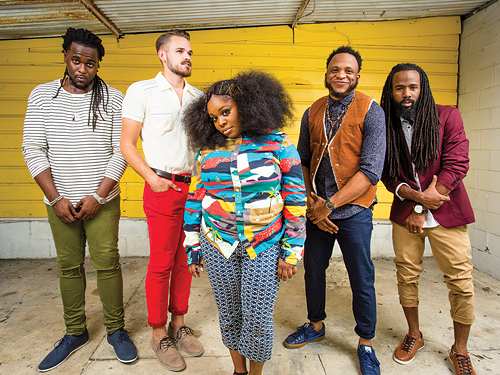Transformative Stew
Tank and the Bangas stir a mix of New Orleans flavors into their boisterous, versatile sound.
By Nick McGregor @mcgregornickLike a sumptuous bowl of gumbo, Tank and the Bangas combine the best of New Orleans music: a heaping helping of classic funk, a dash of modern R&B, a pinch of soul and a substantial dose of hip-hop. But it's their extra flavors—frontwoman Tarriona "Tank" Ball's spoken-word philosophizing and livewire theatricality, her backup band's mix of technical expertise and call-and-response alchemy—that make Tank and the Bangas' musical concoction so tasty.
First rising to prominence as the winners of NPR's 2017 Tiny Desk Concert contest, Tank and the Bangas quickly made the road their home, touring hard to perfect their live show. Equal parts explosive and introspective, political and party-starting, it's a performance that saxophonist and flautist Albert Allenback says is even richer in 2018. "We have a bunch of new music to perform live," he says, "including new interludes, old songs done differently and new connections between songs. We're totally ready to play for people again and create these amazing shared spaces where everybody can be completely present. It's the best part of what we do."
Although they self-produced their first studio album, 2013's Think Tank, Tank and the Bangas have benefitted from a relationship with revered label Verve Forecast for their forthcoming 2019 full-length. Lead single "Spaceships" mines modern hip-hop trends while maintaining Tank's boisterous personality—and giving the band the resources to film a surreal music video. "We did a lot on our own," Allenback says, "but we also got to work with talented producers and engineers who were coaches and sixth men, guiding us through the recording process and putting their own spin on our sound. It's a solid body of work and we're super excited to put it out in 2019."
While the band's profile obviously has grown, Allenback adds that its day-to-day operations haven't changed much. They still land on most new ideas during sound check, organically writing riffs and bits that become songs and interludes when they flex their road-weary muscles. Capturing that naturalistic approach is still hard, too, which explains why Tank and the Bangas are a band best savored on stage. "Bottling our live energy is the whole challenge," Allenback says. "It's very difficult to put Tank's radiance and presence into audio form. She's that theater kid who has all these characters and this sense of drama that she generates, in the best way possible, all the time—no matter what she does."
Allenback credits Tank and the Bangas' unpredictable energy to his fellow bandmates: Norman Spence, Merrell Burkett and Josh Johnson, the latter of whom plays drums and is musical director. "Tank is the centerpiece of our performances, and Josh models everything off of the connections to her. He makes very conscious decisions to treat this like a stage show or a theater performance that flows together. We want our fans to think, 'Was that a single from the record? A new song? A poem? An improvisation?' It's pleasantly disorienting."
That flair has helped Tank and the Bangas cultivate a fervent fan base, one that's followed them from their first performance at Liberation Lounge in New Orleans' Algiers neighborhood to the top of NPR's Tiny Desk Concert heap, where they stood out against more than 6,000 other entries with a video that looks like it was filmed in a high school classroom. Ball and her frequent singing collaborator, Anjelika "Jelly" Joseph, slap mechanical pencils together and use random office props to tell their story of revenge, while The Bangas flow seamlessly from smooth jazz to bouncing funk. Host Bob Boilen described their sound as "organic and on the spot," raving when the band came to Washington, D.C., to perform at NPR headquarters about "the depth of their lyricism" and "their own idiosyncratic flair and humor."
Referencing James Brown's legendary April 5, 1968, concert at the Boston Garden, where Brown and his band put on an impassioned performance and gave the angry, distraught crowd an outlet for their frustration in the aftermath of Martin Luther King Jr.'s assassination, Allenback says live music still has the power to transport and transform. That effect is only amplified when a band puts body positivity, racial harmony and the joy of earthly pleasures like love and dancing at the forefront of its songs and sensibility.
"We've learned to be more genuinely, fearlessly ourselves," Allenback says about the band's evolution. "Doing that onstage helps other people do that in their lives; if you're present, other people are present. And if you amass 300 or 400 people together, all in that same moment, it creates a very powerful field of human community."
More by Nick McGregor
-
Guerilla Toss's Kassie Carlson
The musician opens up about addiction and trying to stay physically and mentally healthy.
- Oct 21, 2019
-
A Delicate Dance
LoveLoud Festival returns for third year of LGBTQ uplift and inspiration.
- Jun 26, 2019
-
Standing Strong
Utah natives Dallon Weekes and Ryan Seaman carve their own glam-rock path with iDKHOW.
- Apr 17, 2019
- More »
Latest in Music
Readers also liked…
-
The Alpines Head North
Local band's debut concept album finds musical bliss in the apocalypse.
- Feb 7, 2024




